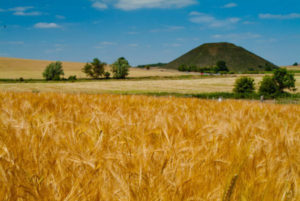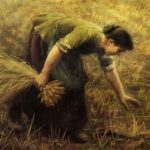Reflections
Heat! The fully stoked engines of the sun are charging full steam ahead into harvest. We are at summer’s midpoint, and while the heat is at its most intense, the hours of daylight begin to visibly decline. Vegetables, grains, and fruits ripen in the fields and orchards. For those of us who live in cities, this means hours tending our own gardens from backyard tomato plants to shares of community garden land and everything in between as well as trips to the local farmers’ markets.
August is also a time for vacation. We walk barefoot in the grass or the sand; the sun’s heat means fewer clothes and fewer demands on our time. As we float in the cool silky waters of a pond, explore exotic sites, or hike up a local mountain, the fire in the belly of the goddess is bearing fruit.
Will there be enough rain, enough sun? Sometimes crops fail and instead of celebrations of plenty we sit in mourning while the specter of famine walks the land. Food scarcity is not part of our immediate experience in the West, but even here the poor suffer from food insecurity, and in places where drought and war ravage the land–in Yemen, South Sudan, Nigeria, and Somalia–crops do fail and people are starving.
During my recent travels through the Midwestern United States, I stopped in southern Illinois to fill up my car with gas. I asked the woman behind the counter if those were soybeans growing in the field across the road. Yes, she said, and began to talk about rain. The plants had gotten a good start, but they were dry now. What was idle curiosity for me, was her livelihood.
According to ancient Irish legend, the holiday Lughnasah (LOO-nə-sə) was first declared by the Celtic god Lugh (LOO), in honor of his mother Tailtiu (tāl-tū), a goddess who embodied the land. In Celtic countries, this is the season for agricultural fairs which were held on hill tops which represented the pregnant belly of Mother Earth. This tradition continued until the 20th century when it became too difficult for motorized vehicles to get up the hills and fair grounds were moved to more level ground. Fairs brought people together to sign on workers for the harvest to come, and celebrate the first fruits of nature’s bounty. Lammas (loaf mass) was a time to bring freshly baked loaves of bread made from the newly harvested grain into the church to be blessed. It is important to honor the divine forces that oversee the harvest no matter how one might envision them.
In many regions of the world traditional practices honor the spirit of the crops being harvested. For example, John Matthews, in his book The Summer Solstice, discusses the practices of the rice-growing Malay and Dyak people of Indonesia who view the vital life-giving spark in the rice plants as kin to the human soul. The life cycle of the rice plant from seedling, to mature plant, to death at harvest is parallel to the human life cycle. Rice plants are treated with the same deference accorded to pregnant women. Rice farmers go about their work in the fields in reverent silence in order not to frighten the soul of the rice and cause it to miscarry. They even feed the rice plants with the same foods pregnant women like to eat. When young rice ears have formed, the women themselves go into the fields to feed the plants with rice pap as if each plant were a human baby. The farmers use a special language to talk to the rice. When it is time to harvest the plants, workers keep the small knives they will use to cut off the head of the rice hidden in their sleeves until the last minute in order not to frighten the spirit of the rice. The cut is made quickly to cause as little trauma possible to the plant. In all of these actions the Malays and Dyaks acknowledge their bond of interdependence with the rice.
The earth is our mother and all things that grow and die upon it are her children. Let us pause in this season of relaxation and plenty to give thanks for the many blessings of our lives and to find ways to honor the spirit of the plants on whom our lives depend. May we consider our interconnection with all beings and share our plenty with those who suffer privation.
Warm, sun-soaked blessings,
Melody
 Honoring the Plants
Honoring the Plants

